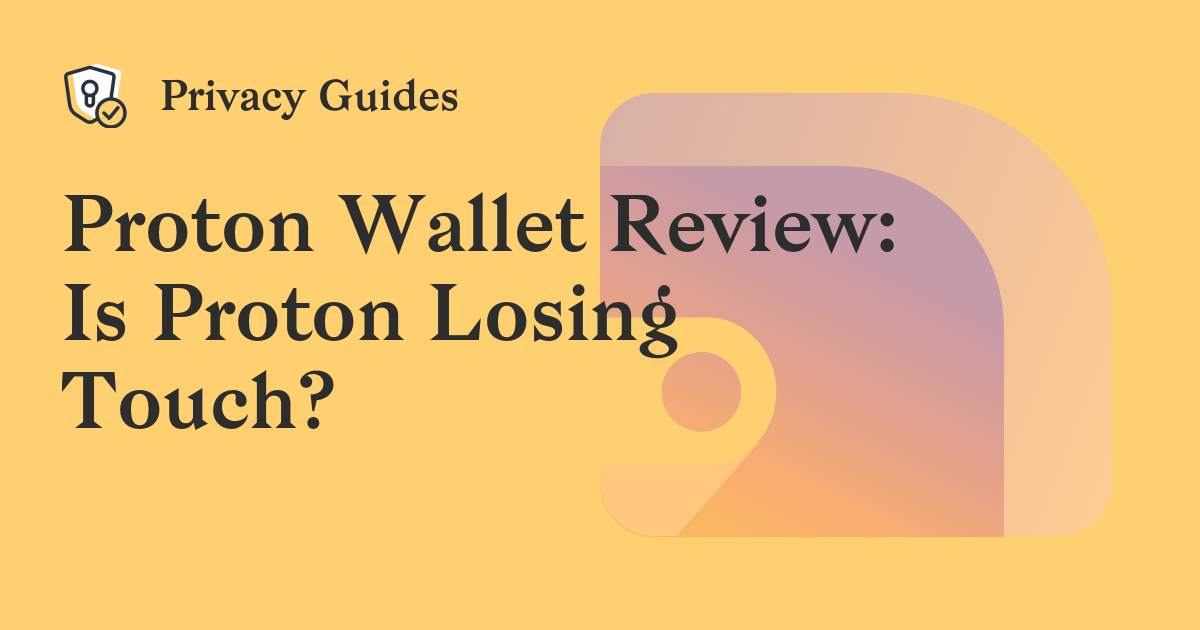- cross-posted to:
- [email protected]
- cross-posted to:
- [email protected]
Proton, the Swiss creators of privacy-focused products like Proton Mail and ProtonVPN, recently released the latest product in their ever-growing lineup: Proton Wallet. Announced at the end of July 2024, it promotes itself as “an easy-to-use, self-custodial” Bitcoin wallet that will ostensibly make financial freedom more attainable for everyone.
It may well be that Proton Wallet is the easiest way to start using Bitcoin, but is a Bitcoin wallet the solution people need to improve their financial privacy?
Contrary to popular belief, cryptocurrency is not an inherently private transactional system.
Had Proton Wallet added support for Monero or a similarly private cryptocurrency, they could have single-handedly boosted a financial system that is actually private by default by a significant degree. In my eyes, failing to do so in favor of the market leader is an unfortunate step back from their “privacy by default” mantra.
Proton Wallet seems like a product that doesn’t know its own place in the world.
Is it meant to save us from the tyranny of payment processors like PayPal who can freeze your funds at a whim?
Or, was Bitcoin chosen to give us independence from fiat currency, including stablecoins, entirely?
However, if Proton Wallet wasn’t meant for all that, if it was simply meant to bring privacy to Bitcoin, then it’s certainly a failure.
Proton hasn’t taken any risks with this product, meaning it’s really only good for satisfying a singular belief: That Bitcoin is just inherently good, and anything to promote Bitcoin is inherently good as well. I don’t share these fanatical beliefs of Bitcoin maximalists, however, when Bitcoin is demonstrably lacking in a wide variety of ways.
Personally, I’m a bit of a cryptocurrency pessimist in general, but I can see some appeal for the technology in very specific areas. Unfortunately, Proton Wallet doesn’t seem to fit in to a useful niche in any meaningful way. The functionality it does support is extremely basic, even by Bitcoin standards, and it simply doesn’t provide enough value over the existing marketplace.
If you’re an existing Proton user simply looking for a place to store some Bitcoin you already have sitting around, Proton Wallet might be perfectly adequate. For everyone else, I don’t see this product being too useful. Bitcoin is still far too volatile to be a solid investment or used as a safe store of value if you crave financial independence and sovereignty, and Proton Wallet simply isn’t adequate for paying for things privately online.



It adds a couple of things which can be useful:
You have a single receive email, but it’s associated with a full HD wallet, so every receive will generate a brand new unused address for the sender. As the email is static, you could for example post it for donations and not have to worry about people being able to track anything you’ve received. Of course this only works with other Proton users which is kind of pointless, but perhaps it’s the start of some sort of interoperability standard?
They have support which you can contact, which while almost certainly isn’t important for you, for your aunty it might be useful.
I still don’t really see who this is for. The requirements to actually using it productively is that your contacts need to also have Proton. If most of your contacts use Proton, that means you’re probably running a business or something and thus don’t need to send BTC to eachother.
Focusing on regular users makes way more sense than focusing on these niche use-cases. Make it so I can easily use cryptocurrencies for online payments. Integration with Proton Pass makes way more sense than integrating with email.
Oh I agree with you. I am a daily crypto user and I have no use for this wallet. I was just offering some things it adds which might be useful.
Lightning is a big missed opportunity. Phoenix is the only wallet I know that has solved this in a user-friendly way.
(I did also mention that it only works between Proton accounts.)
Yeah, not trying to argue with you or anything, it’s just a pretty big disappointment for me. I really want to be able to do privacy-friendly transactions, and I guess I wish someone like Proton or Mozilla would that up.
Something like a Proton Wallet could be really cool if I could add a few different payment options (e.g. XMR, BTC, credit, debit, bank transfer), and then pick the one I want at checkout based on what the vendor supports. They could add this to a phone app and get tap-to-pay working, which would really lower the barrier to people using crypto. It would then be backed by Proton’s privacy and security (e.g. stored on encrypted Proton Drive, no logging, etc).
I probably still wouldn’t use it because I don’t trust any single entity with all of my data, but if it appeals to the mass market, then I benefit as well.
So yeah, I guess I’m just frustrated and disappointed.